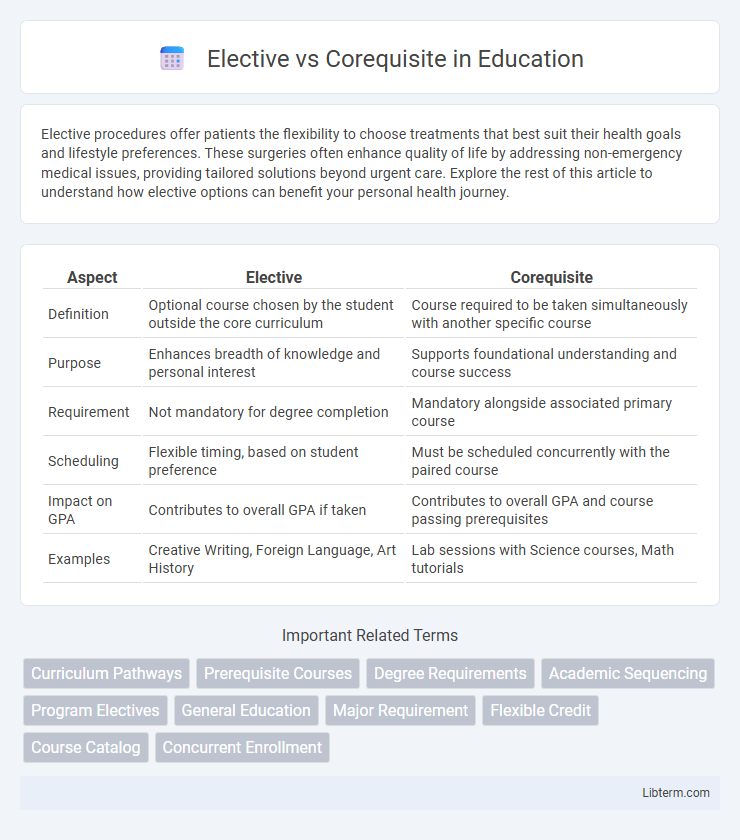Elective procedures offer patients the flexibility to choose treatments that best suit their health goals and lifestyle preferences. These surgeries often enhance quality of life by addressing non-emergency medical issues, providing tailored solutions beyond urgent care. Explore the rest of this article to understand how elective options can benefit your personal health journey.
Table of Comparison
| Aspect | Elective | Corequisite |
|---|---|---|
| Definition | Optional course chosen by the student outside the core curriculum | Course required to be taken simultaneously with another specific course |
| Purpose | Enhances breadth of knowledge and personal interest | Supports foundational understanding and course success |
| Requirement | Not mandatory for degree completion | Mandatory alongside associated primary course |
| Scheduling | Flexible timing, based on student preference | Must be scheduled concurrently with the paired course |
| Impact on GPA | Contributes to overall GPA if taken | Contributes to overall GPA and course passing prerequisites |
| Examples | Creative Writing, Foreign Language, Art History | Lab sessions with Science courses, Math tutorials |
Understanding Elective and Corequisite Courses
Elective courses offer students the flexibility to choose subjects outside their core curriculum, allowing exploration of diverse academic interests and skill development. Corequisite courses, by contrast, must be taken simultaneously with a related required course to enhance comprehension and support academic success. Understanding the distinction between elective and corequisite courses is vital for effective academic planning and fulfilling degree requirements efficiently.
Key Differences Between Electives and Corequisites
Electives are optional courses that students can choose to complement their major, enhancing breadth and personal interest, while corequisites are mandatory courses taken simultaneously with another related course to ensure foundational knowledge and skills. Electives offer flexibility in academic planning, whereas corequisites enforce a structured learning path crucial for understanding interconnected subjects. The key difference lies in their role: electives expand curriculum options, corequisites maintain academic rigor and progression.
Importance of Electives in Academic Programs
Electives play a crucial role in academic programs by allowing students to explore diverse subjects beyond their core curriculum, fostering intellectual curiosity and personalized learning paths. These courses enhance critical thinking, creativity, and interdisciplinary skills, which are essential for adapting to various career demands and lifelong learning. Incorporating electives increases student engagement and satisfaction, ultimately contributing to a well-rounded educational experience.
The Role of Corequisites in Curriculum Design
Corequisites in curriculum design serve as essential courses that students must take simultaneously to reinforce learning and ensure mastery of foundational skills. Unlike electives, which provide flexibility and enrichment, corequisites directly support the primary course content, enhancing comprehension and academic success. Integrating corequisites strategically helps institutions improve retention rates and close achievement gaps by offering timely, targeted support.
Benefits of Elective Courses for Students
Elective courses provide students with the opportunity to explore diverse subjects beyond their core requirements, fostering a well-rounded education and enhancing critical thinking skills. These courses allow students to tailor their academic experience to their personal interests and career goals, increasing engagement and motivation. Exposure to electives also promotes adaptability and interdisciplinary knowledge, valuable assets in today's dynamic job market.
Challenges and Limitations of Corequisite Courses
Corequisite courses often face challenges such as increased student workload and scheduling conflicts, which can hinder effective learning. Students may struggle to balance simultaneous demands of corequisite classes, leading to higher stress and potential academic underperformance. Limited institutional resources and faculty preparedness can also restrict the successful implementation of corequisites.
Selecting the Right Electives for Your Degree
Selecting the right electives for your degree involves identifying courses that complement core subjects while aligning with your career goals. Electives provide opportunities to explore diverse topics and develop specialized skills outside your major's mandatory curriculum. Carefully balancing electives with corequisite requirements ensures a well-rounded education that enhances both knowledge and academic flexibility.
Impact of Corequisites on Student Progress
Corequisites significantly enhance student progress by enabling simultaneous enrollment in foundational and support courses, reducing delays in credit accumulation and improving overall graduation rates. Research shows that corequisite models decrease course failure rates compared to traditional prerequisite sequences, especially in developmental education subjects like math and English. Institutions implementing corequisites report higher retention and completion rates, demonstrating a positive impact on academic momentum and timely degree attainment.
Common Misconceptions About Electives and Corequisites
Electives are often mistaken as optional courses with no academic significance, while corequisites are incorrectly viewed as easier or less demanding classes. In reality, electives enhance specialized knowledge or skills outside the core curriculum, whereas corequisites must be taken simultaneously with related courses to support foundational learning. Misunderstanding these roles can lead to underestimating the importance of corequisites in ensuring academic success and mistakenly prioritizing electives over necessary corequisite coursework.
Tips for Balancing Electives and Corequisites
Balancing electives and corequisites requires careful planning to manage workload and ensure academic success. Prioritize corequisites that are mandatory for your program while selecting electives that complement your interests and career goals without overwhelming your schedule. Utilize academic advising and time management strategies to maintain a steady pace and meet all course requirements effectively.
Elective Infographic

 libterm.com
libterm.com